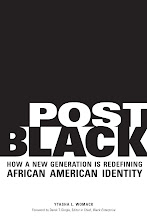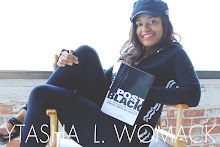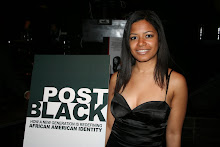Erica Watson is the star of the touring one woman show Fat Bitch a comedic exploration of plus sized women, sexuality and identity. A stand up comic, Watson also stars in the critically acclaimed film Precious. Fat Bitch ended the Chicago run and will run in New York City early next year.
YLW: You starred in Precious. How did that film handle the plus size issue?
EW: Precious dealt with so much. As far as the plus size issue, a lot of it was unsaid. A lot of the film showed how a person who looks like that is invisible to the world. It shows how as a plus sized girl no one paid attention to her. There's a Precious everywhere. If Rihanna looked like Precious, would we care about Chris Brown hitting her? Do you care about the fat girl and what happens to her? Do we care more about women who are beautiful? When I looked at how the audience reacted, people said damn she's fat, or damn she's ugly.
YLW: I thought she was cute.
EW: I think she's cute, too. I get it too when I'm auditioning. People think Beyonce is so thick. So to see someone like me or Precious who's a straight up 24 on screen takes a while to adjust.
YLW: Isn't a size 12 considered plus size today?
EW: I have friends who are plus size models and they are 10s and 12s. But every woman feels the pressure. Magazine covers have a white woman who's a size zero. The same magazine that effects me effects everyone else. It effects Gabby (Sidebe, star of Precious). It effects us all. Even in the smaller size stores, they change the tags so that a woman who is an eight will think she's a four. I'm so tired of every woman being subjected to that type of stuff. You should be you and feel comfortable in your body no matter what size it is. I'm not one of those comedians who has an issue with skinny girls. Just love you.
YLW: Why did you create "Fat Bitch?"
EW: I've always enjoyed comedic performers like Whoopi Goldberg, John Leguizamo and Sandra Berhard. I loved that they didn't just do stand up. They talked about their lives and allowed their one person shows to be an extension of their stand up. I wanted to talk about pressing issues that were important to me without being in the framework of a set up and a punch line. There was a festival in NYC last year that spotlighted African American comedians who don't fit the stereotype of the Def Jam era. I said let me present my one woman show, and I kept developing it.
YLW:When you do stand up, audiences expect you to perform a Def Jam style comedy routine?
EW: When I perform for black audiences they want to hear certain types of comedy. There's nothing wrong with that. They want to talk about things they feel we all relate to. But it puts undue pressure on comics who can't be themselves because they're trying to fit a mode of what's considered funny to black people. As comedians we're really diverse. When people hear black comic they think urban and I'm not an urban comedian.
YLW: Urban is used to describe black audiences for fashion, music, entertainment. What is an urban comedian?
EW: Urban for me is th new word for the N-word. It's a politically correct way of saying you're the N-word. If you take these other words used to describe us like ghetto, hood - that's the comedy they expect. But we're not all urban. But a lot of times people use that term urban as ghetto black. I don't classify myself that way.
YLW: What do you want audiences to get from “Fat Bitch?”
EW: I want people to get from it that no matter who you are, regardless of your class, your size, we all have things about us that people use to stereotype you and put you in a box. For me, the mammy stereotype or the fat and sassy black woman stereotype is used to form an opinion of who I am.
YLW: How does someone perceive you in a mammy context in 2009?
EW: It has more to do with media and entertainment. When we're cast we're always nurturing someone else's need. Fat girls don't have boyfriends. We're here to sing and help everyone else with their problems. In real life if you ask people what they think about a plus size woman, larger weight is associated with lower class. If she's plus size, she' not wealthy. She's supposed to be a bus driver, a meter maid, a lunchroom lady. Those are the stereotypical things you think about with plus sized women. I have a masters degree. I'm smart. I'm fashionable. I'm sexy. I'm all those things. I'm not loud and abrasive. It's not like I can't wait to get to the club and drop it like it's hot and do a split and bring attention to myself.
YLW: (Laughing) Did you just say drop it like it's hot and do a split at the club? Is that what people expect?
EW: Yes. When you're treated that way, you can become a bitch, it makes you want to lash out. If I'm a fat bitch it's because society has made me that way.
YLW: Why do you think these stereotypes are placed on plus sized black women?
EW: I think they make them of all of us. There are other ways in which we are all stereotyped. When President Obama was running for office, middle America was like 'oh my God, this middle class black family, they love each other.' But if you live on the South Side of Chicago, you see that all the time. There's ways that all of us are stereotyped. Even black women on prime time TV aren't allowed to be really beautiful and strong. But if you're a young black woman who's educated and beautiful, we don't see you. Then people assume you don't exist.
YLW: How are people responding to Fat Bitch?
EW: Most people love it or at least that's what they tell me. Even if people don't agree with some of the things I say on stage, they can respect my ability to be honest and fearless in approaching the subject. There has never really been a project to talk about plus size women and our bodies and how it reflects on black women of all sizes.
YLW: How do stereotypes of plus sized black women reflect on black women of all sizes?
EW: A lot of the issues I bring up in the show, most skinny girls don't know about. They don't know about the parties where men come to meet full figured women. Most skinny girls don't know that's going on. Or the pretty face syndrome. People don't know what to do with you if you're fat and cute. Most skinny girls have no problem if your boyfriend has a big girl as a friend, but what if she's fat and cute? It poses other problems. Some of the stuff I talk about in my show women reach out to me about.
YLW: What do they say?
EW: They say I'm a skinny girl and I never thought my guy would like full figured women. Then I look in his porn collection and he has big girls all in his videos. Men like woman of all sizes. There haven't been many shows about black women and sexuality. A lot of men are uncomfortable, too. Even in my show where I talk about how promiscuous I was in college and my partners. Or how I had all this sex and never had a orgasm before.
That kind of thing isn't discussed. The same guy that might say to you that you're not thick enough, will come to me and tell me the exact opposite and how I should look like you. We're dealing with the same crap and we're all connected. As women, we're subjected to all these images. Cable TV tells us one thing, magazines tell us another, network TV tells us something else. But where do we as women create our own identities and say I don't care I”m just gonna be me.
YLW: True. The messages are conflicting and people need to create a space where they can appreciate themselves.
EW: Talk about post black identity, take the Hottentot Venus. Her body was on display because of her small waist and large behind. Then you have black women who are still objectified that way today. Once you go from thick to plus size, it's a different story. It's one thing dealing with the texture of your hair, and the color of your skin, then add the size of your waist . . . I see these panels where they talk about black women and self esteem, but there are never full figured women on these panels and most of the women are beige. We don't include plus sized women in the mix. How are you talking about self esteem when everyone on the panel looks the same?
YLW: I hadn't thought about that. Why don't we see plus sized women on panels about self esteem?
EW: When people talk about self esteem it's aspirational. It's about aspire to be better. But now since fat people are the new N-word in society – you can't turn on CNN without them talking abut the war on fat or the war on obesity. It's not a war on the health industry, but a war on fat people So considering that if you have a panel on self esteem do you want a fat woman on the panel? So, I get it.
YLW: Health and nutrition is a big issue. How do you advocate for better diet and respect for plus size women?
EW: I do want Americans to be healthy. I want black women to be healthy in every way: physical, sexual, and mental health. I think if someone's HIV positive today, no one would support discrimination against them. Even if you feel someone plus size should lose weight or be healthy, that doesn't mean don't hire me for a job. If you don't like it fine, but don't treat me badly because of my size.
EW: I just feel like black women have so many things to deal with as a whole. Talk about post black racial identity. What do you do if a women my size is supposed to be like mammy, but I'm not her complexion? I don't' have her issues. If I look more like the tragic mulatto but I'm mammy size who am I?
YLW: Does anyone ever fit a stereotype?
EW: None of us do. We're multifaceted. We're educated, we're evolved, artistic. You can go to the Art Institute and have a good time. But you might want to grab a drink with your friends at the Dating Game on Stony Island. But black people who do a lot of things and are in the mix of things, they don't know where to put us. I'm in NYC. There is no black middle class. In NYC either you're rich or you're poor and everyone in between is trying to get to one or the other. I go to the Guggenheim, but I still want to get some fried fish and put hot sauce on it. It's like who are these people? Is it called code switching when you go from different experiences.
YLW: Code switching?
EW: When black people have to switch from one identity to another. If you're a middle class black person you have three different faces, being in the corporate world is different from middle class black world. When I was in Chicago at my show, the majority of the black press would not write about me. They assumed it was something hood or ghetto. But the white press, when they read Fat Bitch, they assume I was a feminist because many feminist have taken on the word bitch as a word of empowerment about themselves, in that I'm talking about size, or being a fat activist. I'm not a fat activist. I'm a size activist.
YLW: What's a size activist?
EW: I believe that all people of all sizes should be accepted.
YLW: You said some black press wouldn't write about you? Why not?
EW: One writer told me her editor told her they couldn't talk about me because it was trash. It's that black bourgeois existence that really isn't that evolved. They're not exposed to as much culture as they would argue that they are. If my show was a gospel stage play at the Regal called Hot Grits Will Burn Your Tongue, every Negro would buy a $35 ticket to my show. If you do something different, you would think forward thinking black people would come out but they don't. Now I had a lot of people come out. They saw my flyer and said what's this? It's like open your mind, there's more out here than the stereotypical stuff. I don't know what it is where we think we're so high folluting. But really they haven't changed their mentality from that of a slave.
YLW: They're looking for others to validate you first?
EW: Yes. A lot of times we say black people are trend setters. In some ways we are, in other ways we are followers. We set trends within this realm of existence within a context that someone else gave to us. True trend setters step outside of the mode. That's what I want to do with my show. I want it to be profound. I don't take myself too seriously. I'm honest with myself, and open about mistakes I made. If I can help other women express themselves and encourage other women then I feel good.
I think what you're doing is so interesting. I think that is a question we have to ask? Who are we? what is our identity in this country now and abroad? No one is really talking about this new generation of African Americans. It's hard to put us in a box.
For more information on Erica Watson view www.ericawatson.com.
Subscribe to:
Post Comments (Atom)




No comments:
Post a Comment